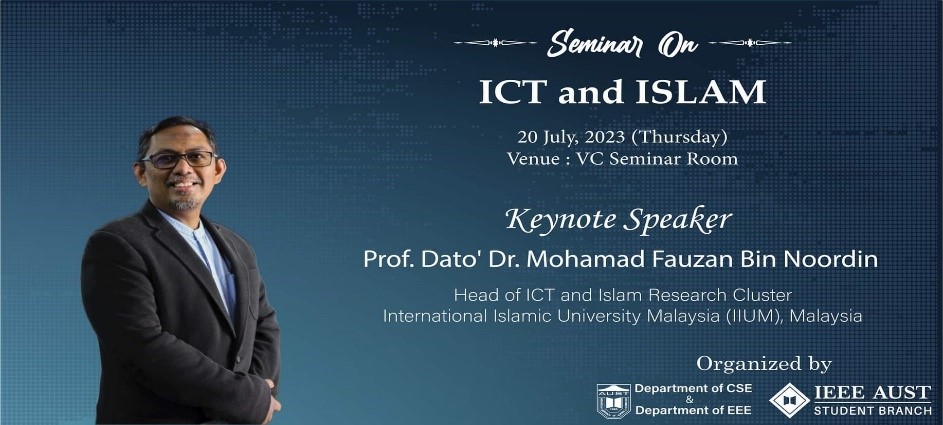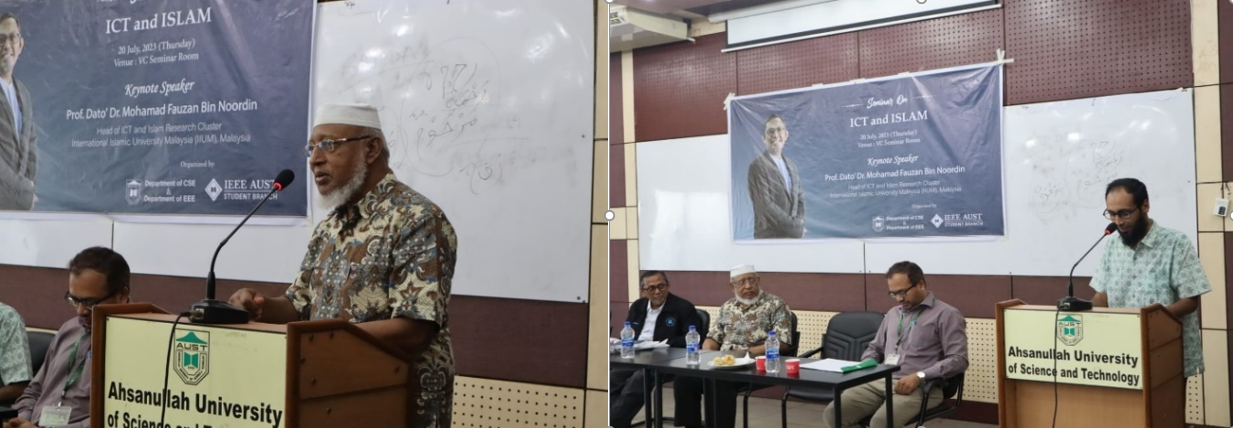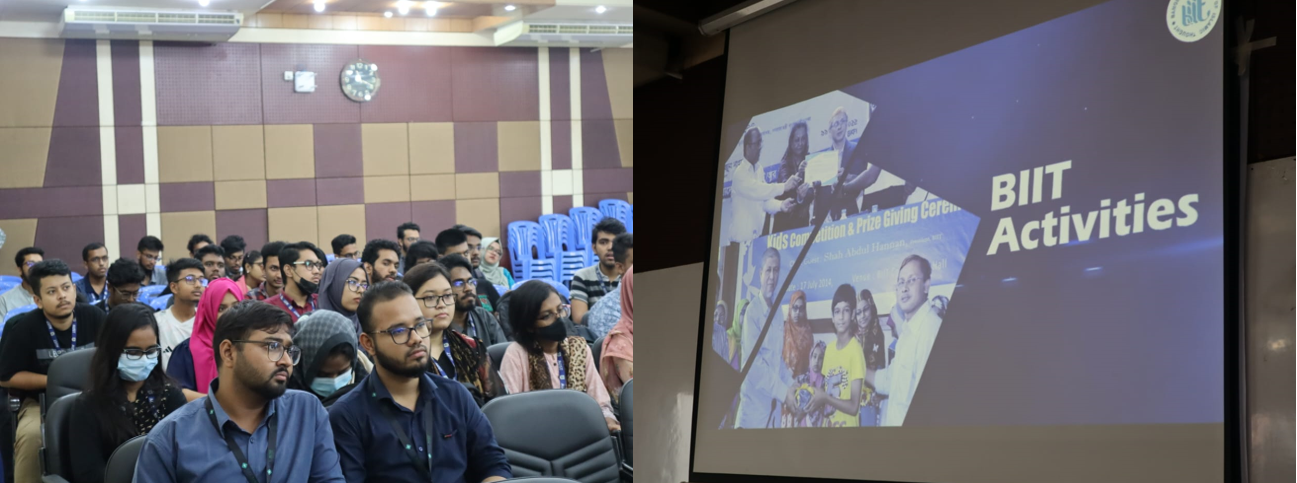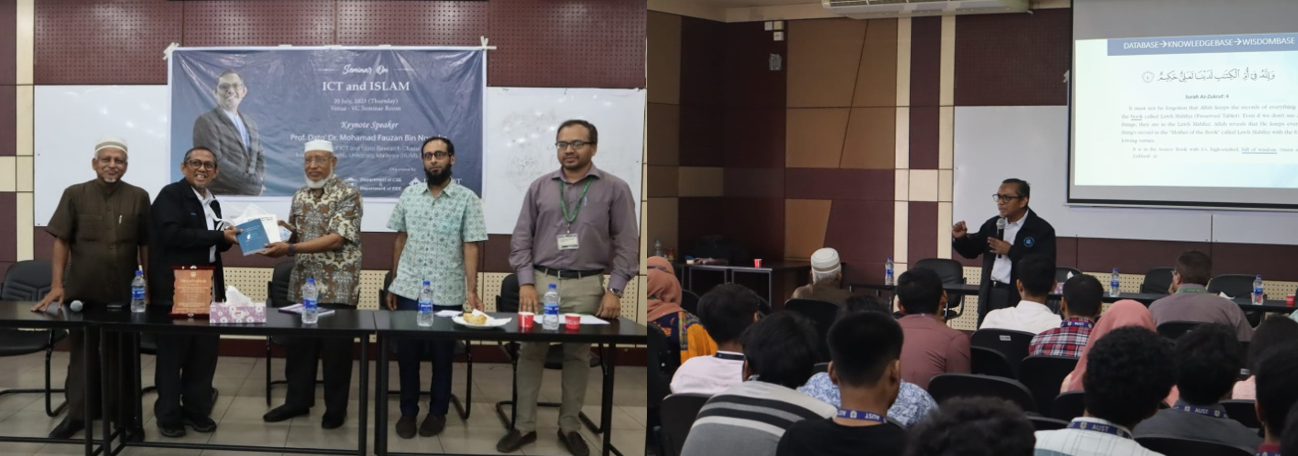
Date: 2023-07-28
On the 20th of July 2023, at 11:00 AM, the Department of Computer Science and Engineering (CSE) and the Department of Electrical and Electronic Engineering (EEE) at Ahsanullah University of Science and Technology (AUST) jointly organized a seminar titled “ICT and Islam” in collaboration with the IEEE AUST Student Branch at VC Seminar Hall, AUST. Prof. Dato' Dr. Mohamad Fauzan Bin Noordin, who is now serving as the Head of the ICT and Islam Research Cluster at the International Islamic University Malaysia (IIUM), Malaysia, served as the seminar's keynote speaker.
The guest arrived at 10:30 AM. and Honorable Vice Chancellor of AUST Prof. Dr. Muhammad Fazli Ilahi, Prof. Dr. Md. Shamim Akhter, Prof. Dr. Md. Shahriar Mahbub and Dr. Taslim Taher from the CSE department, and Prof. Dr. Tareq Aziz from the EEE department greeted the guest heartily.

Subbhun Raida Karim, an EEE student and the vice chair of the IEEE Student Branch Chapter, AUST, welcomed the guests. She gave everyone there a cordial welcome speech and introduced the keynote speaker and the subject. More than hundred enthusiastic students and around twenty faculty members from CSE, EEE, and other disciplines attended in the seminar.
Prof. Dr. Tareq Aziz, department head of EEE, gave a welcome address before the keynote began and thanked the planners for putting together such an educational and interesting event. He also expressed his appreciation to the audience for attending the lecture. He highlighted the enormous significance of ICT in our daily lives. Additionally, he spoke strongly about the possibility for transformation that results from the fusion of the ICT and Islamic worlds. Then, Md. Solaiman Miah, Director of Collaboration at BIIT, gave a video presentation showcasing BIIT and their research endeavors. In addition, with his wealth of knowledge, he shared crucial information on the topic, enriching the experience for all the participants.
The keynote speaker analyzes the fundamental relationship between ICT and Islam in this enlightening talk, concentrating on their conceptual intersections. He digs into the ethical concepts derived from the Qur'an and Hadith, emphasizing its impact on ICT activities such as security and privacy protection. "Qalaam," a major notion introduced, acts as a vital information structure supporting the efficient operation of ICT systems. This novel approach is consistent with Islamic principles, laying the groundwork for ethical and responsible ICT adoption. The seminar highlights the shared emphasis of both ICT and Islam on the importance of people-ware and heart-ware in the ICT field. Moreover, the speaker underscores the critical role of e-government, advocating for trust, transparency, and accountability in employing ICT for governance. Through practical demonstrations, he illustrates how ICT can enhance government operations while maintaining public trust, fostering a more responsible and responsive administration. Ultimately, the seminar elucidates how ICT and Islam converge to offer a visionary roadmap for the future, presenting comprehensive solutions to address the needs of the Muslim community and society at large. The seminar's impact continued with an engaging interactive Q&A session, generating an overwhelming response from the audience.



Following that, the Honorable Vice Chancellor of AUST, Prof. Dr. Muhammad Fazli Ilahi gave the visitors some sound advices while also presenting our keynote speaker with a token of appreciation. He also urged everyone to hold such gatherings on a regular basis. The keynote speaker generously gave a book to the Vice Chancellor that digs into the nexus between ICT and Islam.
At the last the seminar was concluded by the vote of thanks from Prof. Dr. Md. Shahriar Mahbub, Head of the Department of CSE. Prof. Shahriar concluded the seminar by thanking the speaker for his precious time and efforts, as well as the seminar committee members. IEEE Student Branch representatives and university engineers were also acknowledged for their technical assistance.
